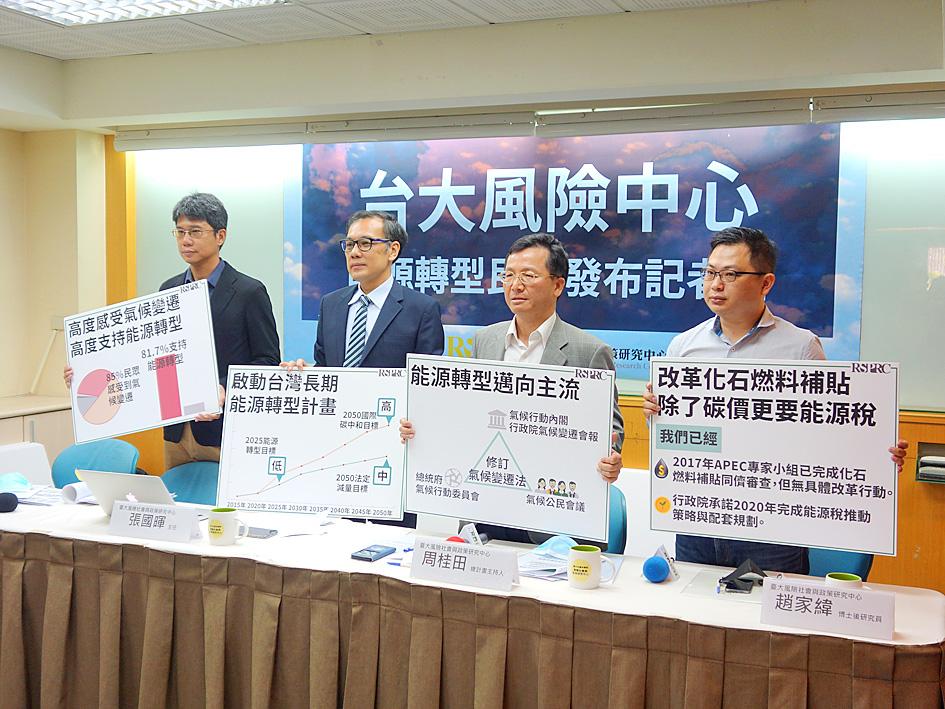More than half of respondents in a survey said that they could accept electricity and fuel price hikes to promote energy reform or collect a carbon tax, National Taiwan University’s Risk Society and Policy Research Center said yesterday.
The center said it released the survey to push President Tsai Ing-wen (蔡英文), who is to begin her second term on Wednesday next week, to expedite energy reform.
The Tsai administration vowed to promote energy transformation by phasing out nuclear energy, while having 20 percent of the nation’s power generated from renewable sources, 30 percent from coal-fired power and 50 percent from natural gas by 2025.

Photo: Wu Po-hsuan, Taipei Times
As of last year, 13.4 percent of the nation’s power was generated from nuclear energy, 6 percent from renewables, 79.2 percent from fossil fuels and the remainder from pumped-storage hydroelectricity, Taiwan Power Co’s Web site showed.
At a news conference in Taipei, the center said 78.5 percent of respondents to its survey agreed with the government’s energy policy, while 12.1 percent disagreed.
Asked if they would support increasing electricity prices from an average of NT$2.6 per kilowatt-hour (kWh) for energy reform, 62 percent said yes and 18.8 percent said no, while 19.2 percent said they had no opinion.
If the price hike is to happen by 2025, 26.6 percent said they could accept a price of NT$2.7 to NT$3 per kWh; 11.5 percent accepted NT$3.1 to NT$3.5 per kWh; 11.3 percent accepted NT$3.6 to NT$4 per kWh; 1.4 percent accepted NT$4.1 to NT$4.5 per kWh; and 11.2 percent accepted a price of more than NT$4.6 per kWh, the poll showed.
The Ministry of Economic Affairs has estimated that average electricity prices would rise to between NT$3.08 and NT$3.39 per kWh by 2025 under current energy policy and fuel costs, center postdoctoral fellow Chao Chia-wei (趙家緯) said.
Compared with the center’s survey in 2018, the number of people who said they could accept an electricity price of more than NT$3.1 per kWh has increased by 7 percentage points, he said.
Electricity prices should better reflect their external costs, he added.
Asked why they would support an electricity price hike, 57.8 percent said to improve air quality.
The poll found that 56.7 percent of respondents could accept a rise in fuel prices due to a carbon tax, among whom 34.3 said they would accept a rise of more than NT$3 per liter.
While the nation’s COVID-19 situation is easing, the government should seize the opportunity to expedite energy reform, such as requiring returning businesses to propose carbon reduction plans, center lead principal investigator Chou Kuei-tien (周桂田) said.
The Executive Yuan should establish a climate change task force to proactively plan the nation’s climate action and energy transformation road maps, with the goal of becoming a carbon-neutral society by 2050, he said.
The poll, conducted from April 6 to 10, collected 1,087 valid samples by telephone, including 785 home numbers and 302 mobile numbers. It has a confidence level of 95 percent and a margin of error of 2.97 percentage points, the center said.
The subhead has been amended since it was first published.

Taiwan is stepping up plans to create self-sufficient supply chains for combat drones and increase foreign orders from the US to counter China’s numerical superiority, a defense official said on Saturday. Commenting on condition of anonymity, the official said the nation’s armed forces are in agreement with US Admiral Samuel Paparo’s assessment that Taiwan’s military must be prepared to turn the nation’s waters into a “hellscape” for the Chinese People’s Liberation Army (PLA). Paparo, the commander of the US Indo-Pacific Command, reiterated the concept during a Congressional hearing in Washington on Wednesday. He first coined the term in a security conference last

Prosecutors today declined to say who was questioned regarding alleged forgery on petitions to recall Democratic Progressive Party (DPP) legislators, after Chinese-language media earlier reported that members of the Chinese Nationalist Party (KMT) Youth League were brought in for questioning. The Ministry of Justice Investigation Bureau confirmed that two people had been questioned, but did not disclose any further information about the ongoing investigation. KMT Youth League members Lee Hsiao-liang (李孝亮) and Liu Szu-yin (劉思吟) — who are leading the effort to recall DPP caucus chief executive Rosalia Wu (吳思瑤) and Legislator Wu Pei-yi (吳沛憶) — both posted on Facebook saying: “I

Sung Chien-liang (宋建樑), who led efforts to recall Democratic Progressive Party (DPP) Legislator Lee Kun-cheng (李坤城), was released on bail of NT$80,000 today amid outcry over his decision to wear a Nazi armband to questioning the night before. Sung arrived at the New Taipei District Prosecutors’ Office for questioning in a recall petition forgery case last night wearing a red armband bearing a swastika, carrying a copy of Adolf Hitler’s Mein Kampf and giving a Nazi salute. Sung left the building at 1:15am without the armband and covering the book with his coat. Lee said today that this is a serious

The Ministry of Economic Affairs has fined Taobao NT$1.2 million (US$36,912) for advertisements that exceed its approved business scope, requiring the Chinese e-commerce platform to make corrections in the first half of this year or its license may be revoked. Lawmakers have called for stricter enforcement of Chinese e-commerce platforms and measures to prevent China from laundering its goods through Taiwan in response to US President Donald Trump’s heavy tariffs on China. The Legislative Yuan’s Finance Committee met today to discuss policies to prevent China from dumping goods in Taiwan, inviting government agencies to report. Democratic Progressive Party Legislator Kuo Kuo-wen (郭國文) said